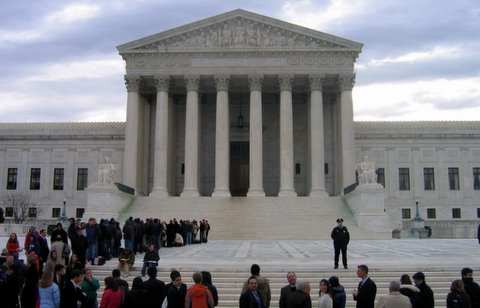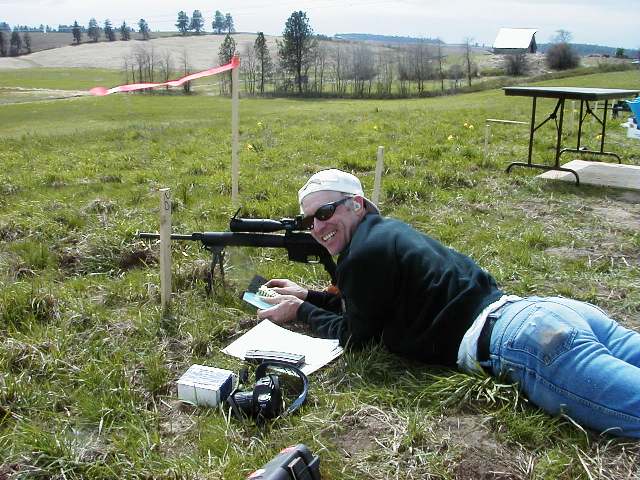I have lots to say but a bunch of Boomershoot stuff to get done has a higher priority for me.
FOR IMMEDIATE RELEASE
Full contact info at end
DATELINE: Washington, D.C. 3/18/08
Recovering from the Whirlwind of the Day
Heller Case Goes Better Than Expected
by Alan Korwin, Co-Author
Supreme Court Gun Cases
The bottom line is, I think we’re going to be OK.
When Justice Kennedy flat out said he believes in an individual right under the Second Amendment, there were no gasps in the hush of the High Court, but you could tell the greatest stellar array of gun-rights experts ever assembled, all there in that one room, breathed a sigh of relief — we had five votes to affirm the human and civil right to arms.
The transcript will be a key for analysis going forward until June, when the decision is expected, and I’m working without the benefit of that at the moment. Digesting the fleeting and immensely complex speech that took place for one hour and thirty-eight minutes a few hours ago, it’s hard to see how any line of thought could be strung together to support the idea that the D.C. total ban on operable firearms at home can be seen as reasonable regulation, even though Mr. Dellinger, the city’s attorney, tried to suggest it was. He was shot down on this repeatedly, found no quarter from any of the Justices, though several found room to move on what amounts to reasonable restrictions.
And it is easy to see, from the non-stop rapid-fire comments and questions of eight of the Justices (Thomas asked nothing, extending his legendary running silence), how even the most permissive standard of review imaginable for gun-ban laws, could tolerate the District’s level of intolerance toward some sort of right to keep and bear arms.
That would give the pro-rights side what it so sorely wants – an admission that the Second Amendment protects something for “the people,” and the rest of that pie can be baked later.
Dellinger tried to suggest that rifles, shotguns and handguns had different usefulness, actually implying rifles are better for self defense in an urban home, because handguns were so inherently bad or dangerous that cities had a legitimate interest in banning them, but the Court wasn’t buying it, and noting that D.C.’s ban banned everything.
Packed into that short rabidly intense section, the Justices examined:
* Original intent, and actions and writings of the colonies at the time of adoption;
* The meanings of the words, though not to the extent some people had anticipated;
* Separability of the terms keep and bear, whether they represented one right or two, how one could exist without the other, if they had civilian meanings or military ones, if you are “bearing” arms to go hunting and more;
* The scope of the right covered, and whether personal or military protections stood alone, dependent or had preference over each other;
* The “operative” and and preamble clause, and their relationship, meaningfulness, and interactivity with each other;
* The types of weapons that might be covered by the term “arms,”
accepting the idea that some weapons fall outside a sense of militia arms, like “plastic guns” (that’s what they were called) that could escape airport metal detection, or “rocket launchers” (actually a commonly used modern militia arm in some countries experiencing insurgencies, a point that did not come up), and especially machine guns, a repeated point which the Justices did not resolve, especially since it has become the standard issue firearm for our modern armed forces and confused the Miller doctrine of commonly used arms;
* The rise and meaning of strict scrutiny, a doctrine that evolved around the First Amendment and had no actual root in the Constitution, and whose actual definition was fluid and with little consensus.
Scalia asked if permissible limits could restrict you to one gun, or only a few guns, or if a collector couldn’t complete a set like a stamp collector because of a quantity restriction, and then launched into a demonstration of his familiarity with firearms by suggesting a need to have a turkey gun, and a duck gun, and a thirty-ought-six, and a .270, which sent Thomas into a fit of off-mic laughter that other observers missed because they were focused on Scalia;
Noting that Massachusetts in colonial times regulated the storage of gunpowder (it had to be kept upstairs as a fire precaution), Breyer asked if there isn’t a lineage to permissible restrictions, and the Court generally agreed. The point of contention, and it would not go away, was where that line was drawn, and again and again the D.C. absolute ban was found violative in its absoluteness. The decision to test the protection of 2A against this law in particular was a brilliant stratagem.
Dellinger either deliberately misled the Court, or didn’t understand the D.C. ban law (as hard to believe as that is, and it could come back to bite him), because, in trying to make it appear less odious than it was, he:
* Suggested D.C. would carve out an exception for an operable gun if it were used in self defense — which the law flatly does not abide (and a point thoroughly undercut by Heller’s attorney Alan Gura, who pointed out the District had such an opportunity twice and did not do so, and in fact did the opposite);
* For use in self defense, a gun could be easily and quickly unlocked and brought to bear, a point undercut by Chief Justice Roberts who had to fight to get an admission that the gun had to be reloaded as well, since the D.C. law banned loaded and unlocked arms;
* That lead to a wonderful exchange in which Dellinger said a gun can be simply unlocked quickly -– he actually said he could do it in three seconds, after demonstrating a poor understanding of how a lock (available at a “hardware store” nearby) fits on a gun with or without “bullets” in it;
* That lead to Scalia asking about turning a dial to find “3” and then turning it the other way to find the next number;
* To which Roberts noted that, don’t you first have to turn on the light having heard the sound of breaking glass, and then find your reading glasses — which got the biggest audience laugh of the day (there were only a few other soft chuckles during the proceedings);…
OK, I recognize that this is a bit disjointed, and I’m working on an unfamiliar machine, at the end of a grueling endurance test that involved outrageous hours, little sleep, lousy diet, dire cold, miles of up and downhill walking, and I’m getting pretty hungry. I’ll do a better job over time, but I wanted to share some inside scoop you might not otherwise get. Let me, before pausing for some chow (which we’ll have to go out and find), convey some ambience.
Guests of the Court were ushered into the ground floor early on, milling around (line waiters including my friend Bob were prepped on the white marble steps outside). It was a who’s who inside and non-stop on-your-toes meet and greet. John Snyder, lobbyist for CCRKBA/SAF, had read my blog entry from last night, and introduced me to the companion on his lobby bench… Dick Heller, of the Heller case.
A nice mild mannered guy, “I just want to be able to keep my guns.” He said when they started this in 1994, they had no idea what they were getting into, and in 1997 they began entertaining the idea that it could go all the way and started raising funds. Now it had taken on a life of its own and barely involved him. At 9:30 last night, he walked the wait-to-get-in line and passed out cough drops. No one knew who he was. He sat just behind me in the Courtroom. I lucked into the second row.
Directly in front of me was… Mayor Fenty, and I sat in the bright reflected light of his pate. He turned, and in typical smiling politician fashion extended his hand, shook mine, and said warmly, “It’s nice to see you” as if we knew each other. Well at least, I knew him. One seat to my right was Ann Dellinger, the city’s lawyer’s wife, who turned out to be fascinating and a wealth of information. In a few moments, the mayor relinquished his eat to the D.C. Chief of Police, but she didn’t turn and say hi. Heady stuff. Everybody was a somebody.
Familiar faces were strewn about – there’s David Hardy on the other side of the aisle, and Bob Dowlut had a front row seat. Stephen Halbrook, one of my co-authors on Supreme Court Gun Cases had an early spot on the Supreme Court bar-members line, and my other co-author, Dave Kopel, who previously told me he would not be attending, turned out to be a last-minute addition to the Respondant’s table at the head of the Courtroom.
People who I think were on a better “tier” than I, like Joe Olson, Clayton Cramer and others, didn’t luck into a seat and listened to disembodied voices from the lawyers lounge outside the Courtroom.
Three calls for “sshhh” from a clerk at the front instantly dropped the growing anticipatory cacophony to silence which then ramped up gently until the next hiss for quiet. Three minutes to go and a call for silence left everyone with their own thoughts until a tone sounded, the aides signaled us to rise, God Bless This Court was spoken, and we were underway.
By a stroke of luck, Justice Thomas was assigned the reading of a decision of a prior case, and we got to hear his baritone voice, which often remains mute throughout. New members of the Supreme Court bar were sworn in, and Justice Roberts asked Mr. Dellinger to begin, which he did promptly.
More later.
Alan.
Alan Korwin, Co-Author
Supreme Court Gun Cases
Bloomfield Press
Scottsdale, Arizona
602-996-4020
alan@gunlaws.com
http://www.gunlaws.com
Go to my site for this and all future postings, use the email signup on the home page to get direct posts, or get RSS feeds from the blog site, http://www.PageNine.org
alan@gunlaws.com
Bloomfield Press, Phoenix
602-996-4020
http://www.gunlaws.com






